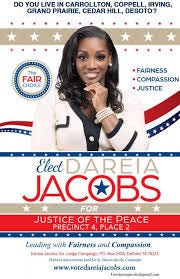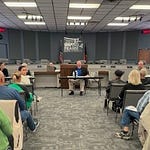This episode is part of our Local Elections channel, where we share clear, community-focused coverage of Grand Prairie elections. From candidate spotlights to issue explainers and voting resources, our mission is to keep you informed, connected, and confident at the ballot box.
When most people think about elections, their minds go straight to the top of the ballot — the presidential race, Congress, maybe governor. But the truth is, the decisions that shape your everyday life often happen much closer to home.
That’s why we created the Local Elections channel at Faces of Grand Prairie: to shine a light on the roles, candidates, and policies that don’t always make the headlines but deeply impact our neighborhoods.
Recently, I sat down with Dareia Jacobs, who is running for Justice of the Peace in Dallas County (Precinct 4, Place 2). She reminded me the bottom of the ballot is often the most powerful part, but those are the races voters often skip right past on Election Day.
What Does a Justice of the Peace Do?
In Texas, a Justice of the Peace is a judge that presides over smaller civil matters, such as evictions, small claims disputes, truancy cases for students, marriage licenses and ceremonies, and even jury trials in some cases. They also oversee constables, who administer arrest warrants and protective orders.
One of the most surprising things about a Justice of the Peace is that a person does not have to be an attorney or have any legal education before running for the seat. “A lot of times people ask, do you have a law degree? … No, I do not, “Dareia explains, “And 85%, maybe less than that, do not have a law degree within [the JP system] … I think they prefer you not to have one because you can become biased in the courtroom. Of course, I’m going to follow the law — we go through “judge school” … but this particular court, this is for the people. This is the people’s court.”
Each Justice of the Peace also sets their own schedule on a weekly basis. “As a judge, it’s not just about sitting in the seat when there’s a case, “she says, “It’s about being present — in the community and in the courtroom. If you’re not in the office regularly, cases pile up, people wait longer for justice, and that slows down the whole process. I don’t want people to say, ‘Who’s my JP?’ I want them to know I’m here, working, and involved.”
Why Compassion and Communication Matter
In our conversation, Dareia spoke about wanting to go beyond the bench — not just presiding over cases, but connecting residents to resources:
Helping families facing eviction find legal and housing aid
Guiding young people away from the courtroom and back toward education
Hosting community seminars so residents aren’t left in the dark on new laws
That’s a big shift from the old model of judges as distant and intimidating. As she put it, “Just because I’m a judge doesn’t make me better than you. I’m going to respect you.”
Why This Matters for You
Here’s the thing: turnout in spring elections is shockingly low compared to November. That means races for JP, city council, and school board are often decided by just a handful of votes.
So when you skip the “bottom of the ballot,” you’re not just leaving blank space — you’re giving up a chance to decide who handles some of the most personal and impactful issues in our community. In races like the Justice of the Peace, where their voting district covers multiple cities like Dareia’s race does, (Precinct 4 includes these cities in Dallas County: Carrollton, Cedar Hill, Coppell, DeSoto, Grand Prairie, Ovilla and Irving), it’s not often voters even recognize the names of people running, which is why local election media covers like the Faces of Grand Prairie matters so much.
Starting a Campaign Early
As Jenna says in the conversation, “We need to start campaigning before two weeks before an election. We need to be talking about some of these seats, especially the ones we don’t always know what they do or how they impact our lives.” These interviews are vital to engaging more voters in local elections. When they get to see someone’s face and hear from them for months rather than a few weeks before an election, it gives them more incentive to not skip over some of our most important electoral seats.
✍️ If you found this conversation useful, please subscribe and share this post.
That’s how we keep Grand Prairie informed, connected, and confident at the ballot box.






